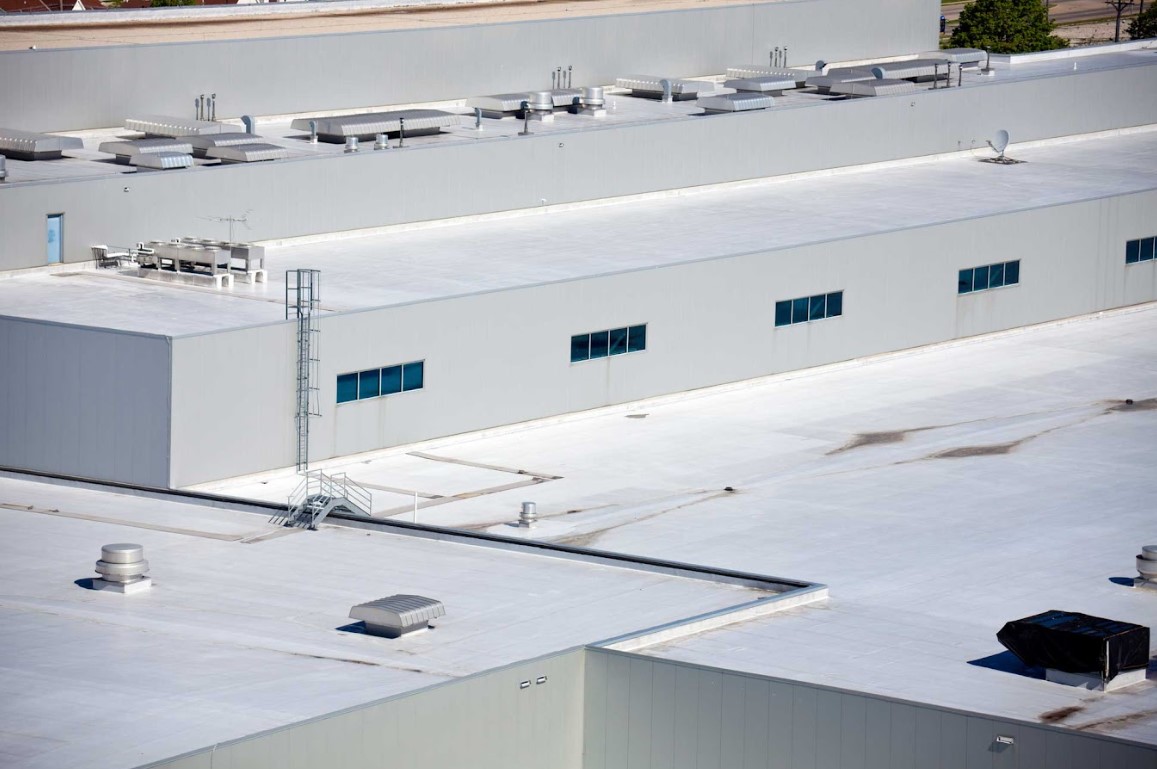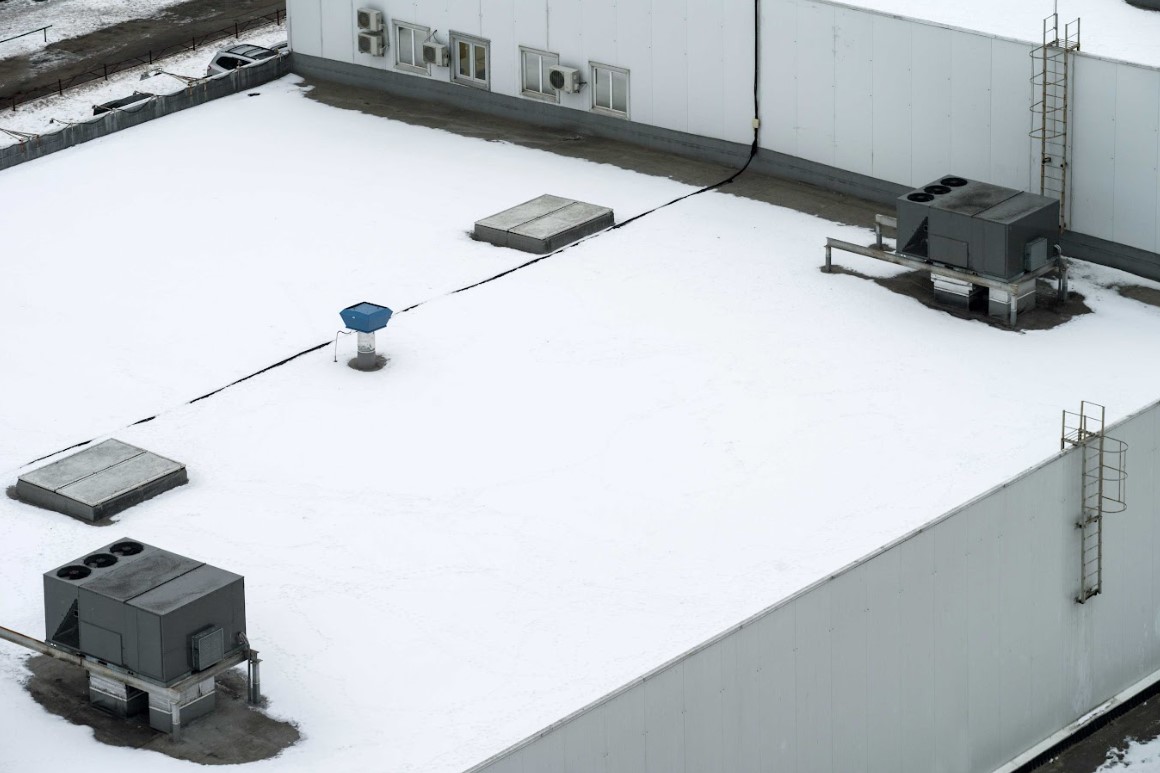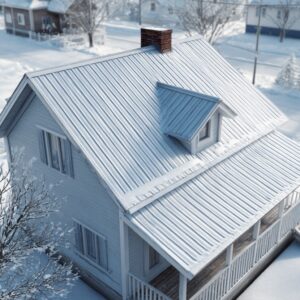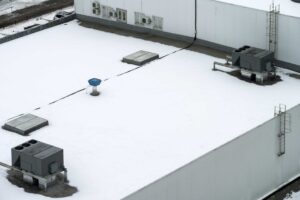Is a Roof Coating Just a Band-Aid—or Real Winter Protection?
Imagine heading into an Ohio winter wearing a windbreaker instead of a heavy coat. It might keep you dry in a drizzle—but it won’t help when the freezing rain and snow arrive. Your commercial roof is no different. A light fix won’t cut it when the weather turns cold and wet, which is why so many building owners ask:
Do roof coatings actually work in Ohio’s tough winter climate—or are they just a temporary solution?
The answer depends on the condition of your roof, the material you use, and how well it’s applied. At Ohio Roofing Solutions, we’re asked this question every fall by property managers, warehouse operators, and business owners preparing their buildings for the season ahead. For many, Columbus OH roof coatings offer a practical, cost-effective way to extend roof life and prevent cold-weather damage.
In this guide, we’ll cover:
- How commercial roof coatings perform in Ohio winters
- What makes them a good (or bad) fit for your building
- Which coating materials work best for flat roofs
- Cost, warranty, and maintenance factors you need to know
- Real results from Columbus-area commercial projects
Need help preparing your roof for winter? Ohio Roofing Solutions can help.
Understanding Roof Coatings and Their Role in Winter Roof Protection
A roof coating is a liquid-applied membrane that creates a seamless, waterproof layer over your existing roofing system. Once it cures, it acts as a flexible skin that protects your roof from water intrusion, UV damage, and—most importantly for Central Ohio—freeze-thaw cycles.
In Columbus OH, our winters bring:
- Freezing rain followed by sudden temperature drops
- Heavy snow accumulation on flat and low-slope roofs
- Ponding water from blocked drains
- Expansion and contraction at seams, joints, and penetrations
When done right, a roof coating doesn’t just stop small leaks—it protects your roof from the constant movement and moisture that damages aging systems every winter.
What to Consider Before You Apply a Roof Coating in Ohio
Coatings can save money and prevent downtime—but only if your roof is a good candidate. Here’s what you need to consider before starting a commercial roof winter prep project with coatings.
1. Is Your Roof Structurally Sound?
Coatings aren’t meant for roofs with major damage or saturated insulation. At Ohio Roofing Solutions, we conduct thorough inspections using drones, thermal imaging, and moisture meters to assess the roof’s health before recommending any solution.
2. What Type of Roof Do You Have?
Different materials require different coatings. For example:
- EPDM (rubber) roofs pair well with silicone coatings
- Metal roofs often perform better with acrylic systems
- Polyurethane is used in high-traffic areas like walkways
Using the wrong product can lead to adhesion failure or voided warranties.
3. Will the Weather Cooperate?
Coatings need dry surfaces and daytime temps above 40°F to cure properly. That’s why we recommend scheduling your coating project between late August and mid-October in Central Ohio.
4. What’s Your Budget?
Roof coatings typically cost 50%–70% less than full replacement. They’re ideal when you need a stopgap solution that offers performance without the disruption of a tear-off.

How Roof Coatings Help Columbus Buildings Get Through Winter
Let’s break down when coatings are worth it—and when they’re not.
When Roof Coatings Are a Smart Investment
Coatings are a great option when:
- Your roof has minor leaks, aging seams, or UV wear
- Your building has flat or low-slope areas with occasional ponding
- You want to prevent further water intrusion
- You need better insulation and energy performance
- You’re not ready to fully replace your roof, but want protection now
In these cases, coatings can extend the life of your roof by 10 to 15 years and prevent costly winter repairs.
When a Roof Coating Isn’t Enough
Coatings are not a solution for:
- Structurally compromised roofs
- Wet or moldy insulation
- Drainage issues caused by sagging or collapsed areas
- Leaks coming from interior condensation or ventilation failures
Our team will never recommend a coating if we believe your roof needs deeper structural work. We believe in doing what’s right for your building—not just what’s easy.
Best Commercial Roof Coating Materials for Cold, Wet Climates
Choosing the right material makes all the difference. Here’s how common roof coating types stack up for Columbus OH commercial roofs.
|
Coating Type |
Ideal For |
Pros |
Cons |
|
Silicone (GACO) |
Flat roofs with ponding water |
Waterproof, long-lasting, handles snow and rain well |
Can be slippery, hard to recoat |
|
Acrylic |
Sloped or metal roofs |
Reflective, affordable, easy to apply |
Not ideal for standing water |
|
Polyurethane |
High-traffic commercial areas |
Durable, flexible, strong adhesion |
Higher cost, stronger fumes during application |
At Ohio Roofing Solutions, we recommend GACO silicone coatings for most flat commercial roofs in Columbus due to their resistance to ponding and freeze-thaw cycles. They bond tightly, stay flexible, and hold up against our tough winter weather.
The Real-World Impact of Roof Coatings in Columbus OH
Improved Winter Efficiency by Sealing Problem Areas
While roof coatings do not technically add insulation or R-value, they seal seams, cracks, and penetrations that can lead to heat loss or moisture buildup. This helps prevent thermal inefficiencies, especially on older roofs. Some customers report 10 to 20 percent reductions in energy costs after coating their roof, depending on the building and condition of the existing system.
Warranties and Service Life
In ideal conditions, coatings can extend the life of a commercial roof by 10 years or more. Some systems include 10- to 20-year warranties when installed by certified professionals. Ohio Roofing Solutions is a certified installer for multiple industry-trusted coating systems.
Local Case Study: Groveport Industrial Facility
We worked with a distribution center outside Groveport that faced minor winter leaks on a 22-year-old EPDM roof. Rather than replace it, the owner opted for a silicone coating. The system was installed in early fall—and the following winter, they reported no leaks, lower energy bills, and no operational downtime.
Common Questions About Roof Coatings for Columbus OH Winters
If you’re a commercial property owner or facility manager in Central Ohio, chances are you’ve asked a few questions about how roof coatings actually perform in real-world conditions. Below are the most common questions we hear from clients preparing for commercial roof winter prep in Columbus OH—with clear, helpful answers.
Do roof coatings help in winter weather?
Yes, roof coatings help protect commercial roofs in winter weather by creating a flexible, waterproof membrane that handles freezing temperatures, snow, and thermal movement. This makes them especially valuable during Ohio’s freeze-thaw cycles.
When is the best time to apply a roof coating in Columbus?
The best time to apply a roof coating in Columbus is between late August and mid-October, when the weather is still dry and temperatures are consistently above 40°F—ideal conditions for proper curing.
Are coatings a permanent solution for commercial roofs?
Roof coatings are not a permanent solution, but they are a long-lasting, cost-effective way to extend the life of an aging roof by 10 to 15 years. They are ideal for protecting structurally sound roofs that are not yet ready for full replacement.
What if my commercial roof has ponding water?
If your commercial roof has ponding water, a silicone roof coating—such as GACO—is often the best solution. Silicone is engineered to withstand constant exposure to standing water, which is common on flat roofs throughout Columbus OH.
How much does a commercial roof coating cost in Columbus?
Commercial roof coatings in Columbus typically cost between $3 and $7 per square foot, depending on the coating type, roof size, and prep work required. This is significantly more affordable than a full tear-off or replacement.
Can roof coatings stop active roof leaks?
Roof coatings can stop minor active leaks, especially those caused by worn seams or flashing issues. However, coatings are not effective for leaks related to structural damage or soaked insulation.
Will applying a coating void my current roof warranty?
Applying a roof coating can void your current roof warranty if it’s not done according to manufacturer guidelines, which is why it’s critical to work with a contractor who understands warranty compliance. In many cases, the manufacturer must approve the coating system and the installer must be certified for the warranty to remain valid—or for a new coating warranty to be issued.
Final Takeaway: Roof Coatings Can Help, but Only If Your Roof Is Ready
Roof coatings aren’t hype. When applied to the right roof at the right time, they can absolutely help your building handle Ohio’s cold, wet seasons. They seal out moisture, improve thermal performance, and buy valuable time—without the cost and complexity of a full replacement.
At Ohio Roofing Solutions, we’ve helped dozens of Columbus-area businesses prepare their roofs for winter using high-performance coating systems. With certified crews, in-depth inspections, and a commitment to long-term value, we’ll help you make the right decision for your roof—not just the fastest one.





